MGMT 1101: Managerial Roles and Leadership for Franchise Recovery
VerifiedAdded on 2023/06/11
|8
|2179
|168
Report
AI Summary
This report addresses a franchise turnaround scenario, focusing on the application of Mintzberg's managerial roles, sources of power, and situational leadership. It discusses how a store manager can leverage roles such as entrepreneur, disturbance handler, resource allocator, and negotiator to improve performance. The report also examines the use of formal and reward power to positively influence team members. Furthermore, it suggests adopting a situational leadership style to adapt to the changing environment and effectively manage the team, emphasizing the importance of flexibility and clear communication to achieve organizational goals. The aim is to provide a comprehensive strategy for turning the franchise around and ensuring its long-term profitability.
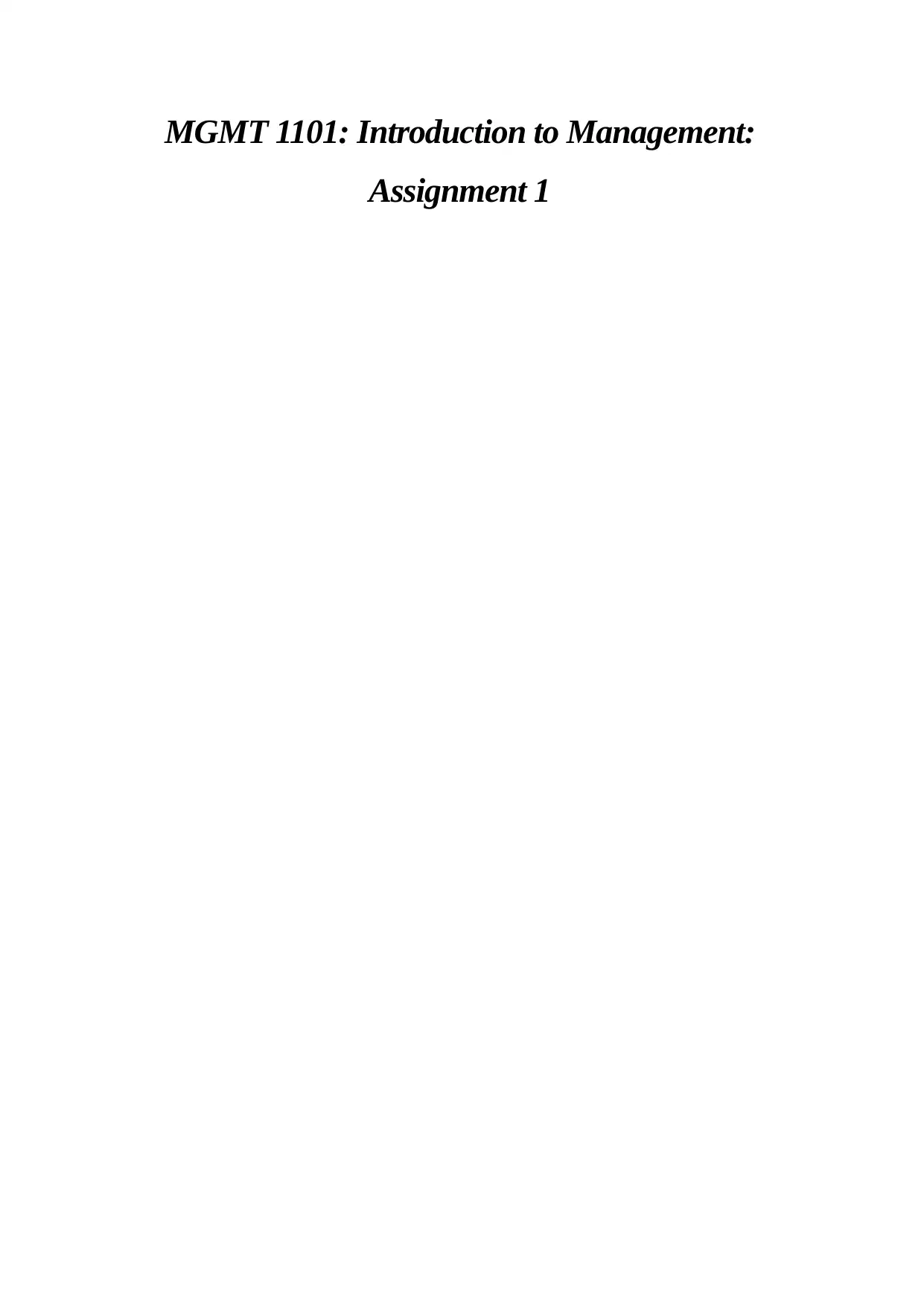
MGMT 1101: Introduction to Management:
Assignment 1
Assignment 1
Paraphrase This Document
Need a fresh take? Get an instant paraphrase of this document with our AI Paraphraser
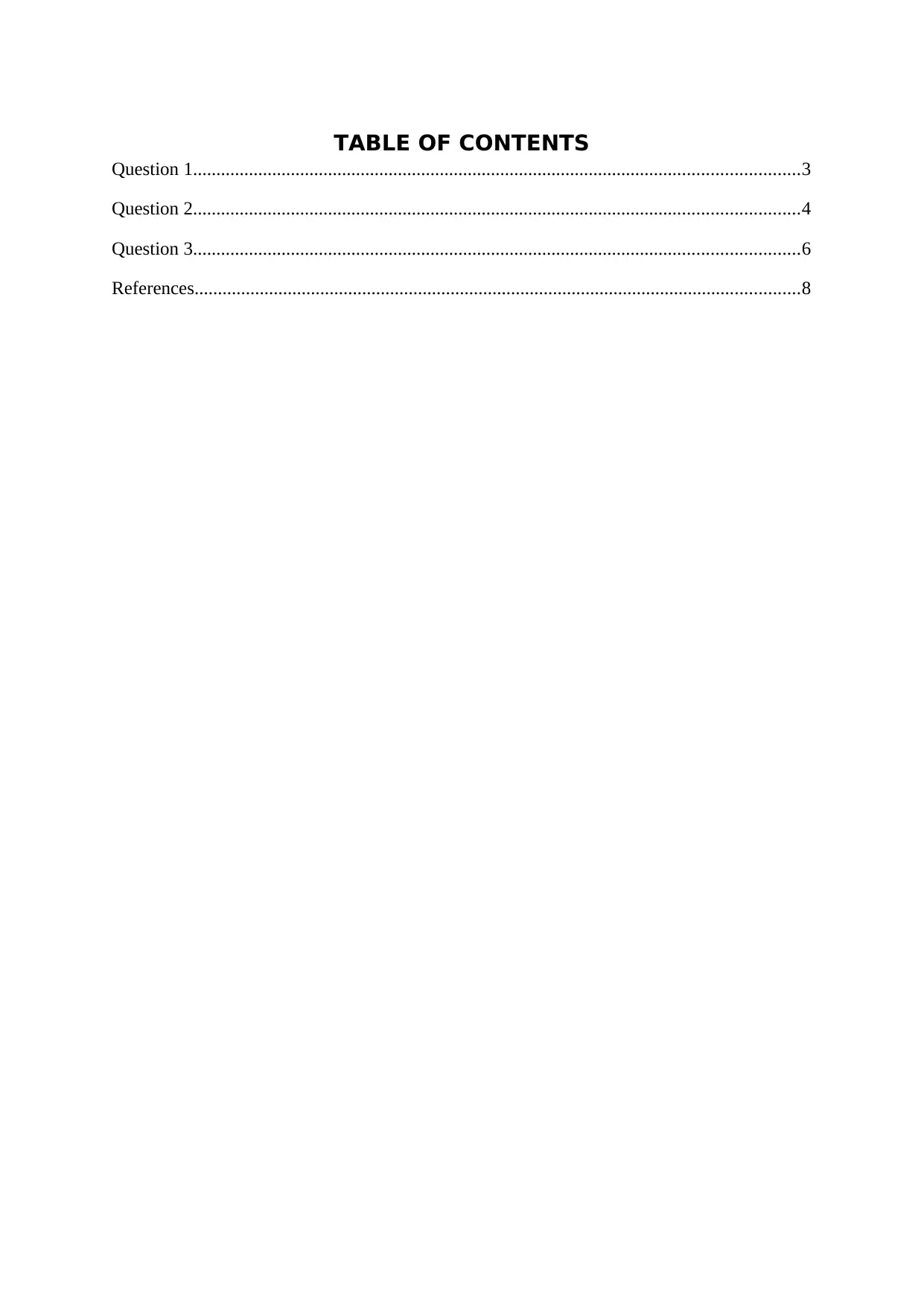
TABLE OF CONTENTS
Question 1..................................................................................................................................3
Question 2..................................................................................................................................4
Question 3..................................................................................................................................6
References..................................................................................................................................8
Question 1..................................................................................................................................3
Question 2..................................................................................................................................4
Question 3..................................................................................................................................6
References..................................................................................................................................8
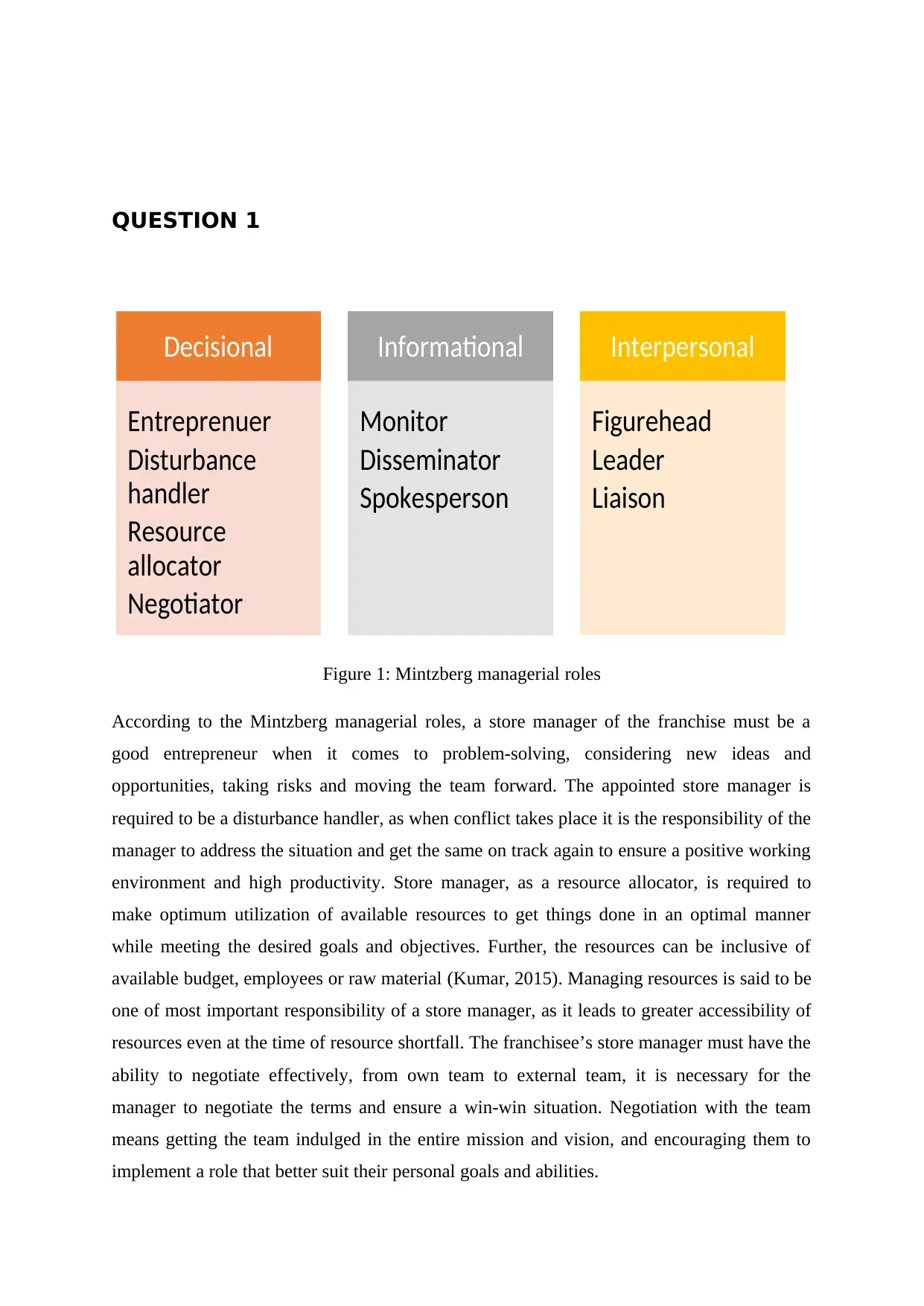
QUESTION 1
Figure 1: Mintzberg managerial roles
According to the Mintzberg managerial roles, a store manager of the franchise must be a
good entrepreneur when it comes to problem-solving, considering new ideas and
opportunities, taking risks and moving the team forward. The appointed store manager is
required to be a disturbance handler, as when conflict takes place it is the responsibility of the
manager to address the situation and get the same on track again to ensure a positive working
environment and high productivity. Store manager, as a resource allocator, is required to
make optimum utilization of available resources to get things done in an optimal manner
while meeting the desired goals and objectives. Further, the resources can be inclusive of
available budget, employees or raw material (Kumar, 2015). Managing resources is said to be
one of most important responsibility of a store manager, as it leads to greater accessibility of
resources even at the time of resource shortfall. The franchisee’s store manager must have the
ability to negotiate effectively, from own team to external team, it is necessary for the
manager to negotiate the terms and ensure a win-win situation. Negotiation with the team
means getting the team indulged in the entire mission and vision, and encouraging them to
implement a role that better suit their personal goals and abilities.
Decisional
Entreprenuer
Disturbance
handler
Resource
allocator
Negotiator
Informational
Monitor
Disseminator
Spokesperson
Interpersonal
Figurehead
Leader
Liaison
Figure 1: Mintzberg managerial roles
According to the Mintzberg managerial roles, a store manager of the franchise must be a
good entrepreneur when it comes to problem-solving, considering new ideas and
opportunities, taking risks and moving the team forward. The appointed store manager is
required to be a disturbance handler, as when conflict takes place it is the responsibility of the
manager to address the situation and get the same on track again to ensure a positive working
environment and high productivity. Store manager, as a resource allocator, is required to
make optimum utilization of available resources to get things done in an optimal manner
while meeting the desired goals and objectives. Further, the resources can be inclusive of
available budget, employees or raw material (Kumar, 2015). Managing resources is said to be
one of most important responsibility of a store manager, as it leads to greater accessibility of
resources even at the time of resource shortfall. The franchisee’s store manager must have the
ability to negotiate effectively, from own team to external team, it is necessary for the
manager to negotiate the terms and ensure a win-win situation. Negotiation with the team
means getting the team indulged in the entire mission and vision, and encouraging them to
implement a role that better suit their personal goals and abilities.
Decisional
Entreprenuer
Disturbance
handler
Resource
allocator
Negotiator
Informational
Monitor
Disseminator
Spokesperson
Interpersonal
Figurehead
Leader
Liaison
⊘ This is a preview!⊘
Do you want full access?
Subscribe today to unlock all pages.

Trusted by 1+ million students worldwide
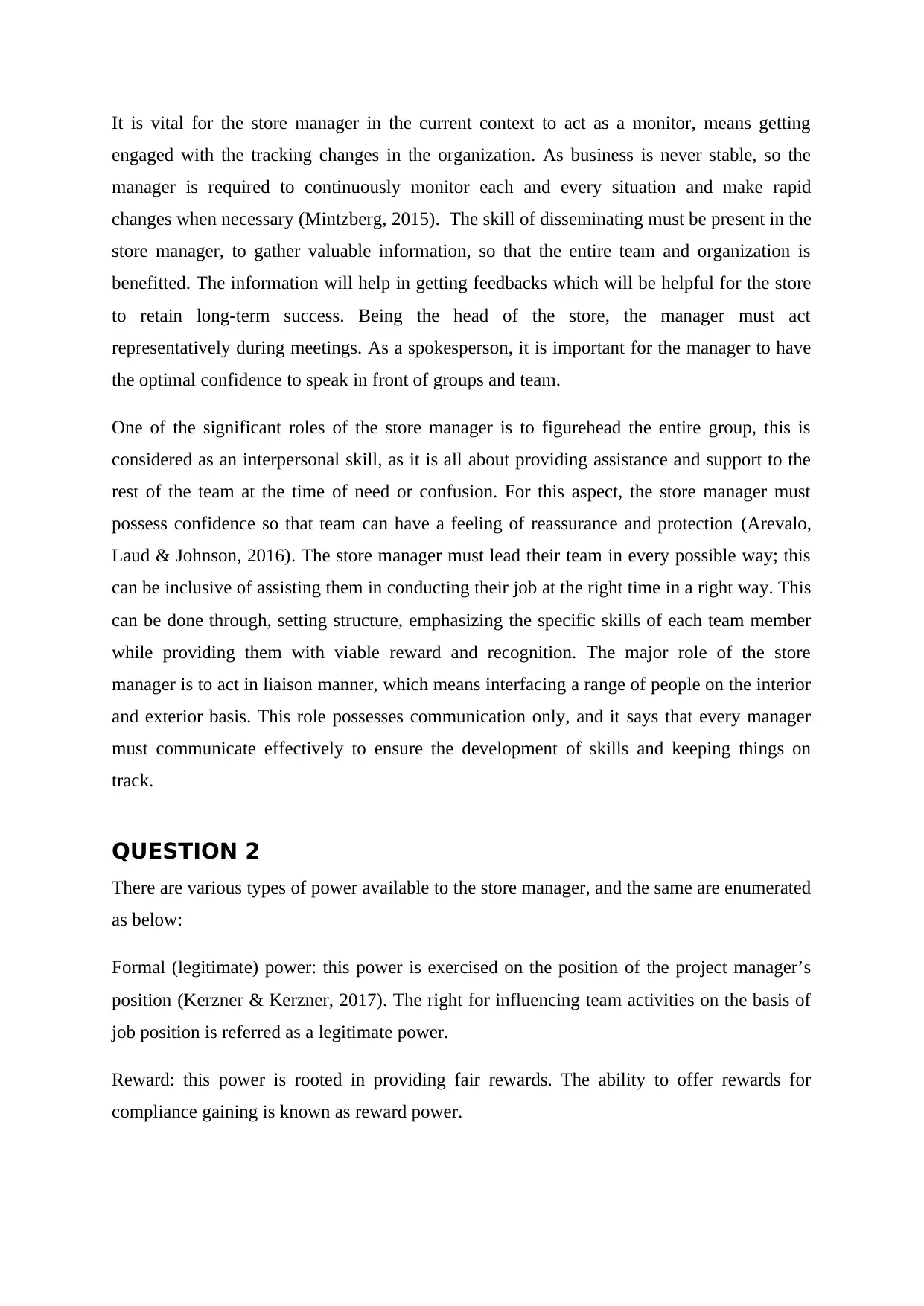
It is vital for the store manager in the current context to act as a monitor, means getting
engaged with the tracking changes in the organization. As business is never stable, so the
manager is required to continuously monitor each and every situation and make rapid
changes when necessary (Mintzberg, 2015). The skill of disseminating must be present in the
store manager, to gather valuable information, so that the entire team and organization is
benefitted. The information will help in getting feedbacks which will be helpful for the store
to retain long-term success. Being the head of the store, the manager must act
representatively during meetings. As a spokesperson, it is important for the manager to have
the optimal confidence to speak in front of groups and team.
One of the significant roles of the store manager is to figurehead the entire group, this is
considered as an interpersonal skill, as it is all about providing assistance and support to the
rest of the team at the time of need or confusion. For this aspect, the store manager must
possess confidence so that team can have a feeling of reassurance and protection (Arevalo,
Laud & Johnson, 2016). The store manager must lead their team in every possible way; this
can be inclusive of assisting them in conducting their job at the right time in a right way. This
can be done through, setting structure, emphasizing the specific skills of each team member
while providing them with viable reward and recognition. The major role of the store
manager is to act in liaison manner, which means interfacing a range of people on the interior
and exterior basis. This role possesses communication only, and it says that every manager
must communicate effectively to ensure the development of skills and keeping things on
track.
QUESTION 2
There are various types of power available to the store manager, and the same are enumerated
as below:
Formal (legitimate) power: this power is exercised on the position of the project manager’s
position (Kerzner & Kerzner, 2017). The right for influencing team activities on the basis of
job position is referred as a legitimate power.
Reward: this power is rooted in providing fair rewards. The ability to offer rewards for
compliance gaining is known as reward power.
engaged with the tracking changes in the organization. As business is never stable, so the
manager is required to continuously monitor each and every situation and make rapid
changes when necessary (Mintzberg, 2015). The skill of disseminating must be present in the
store manager, to gather valuable information, so that the entire team and organization is
benefitted. The information will help in getting feedbacks which will be helpful for the store
to retain long-term success. Being the head of the store, the manager must act
representatively during meetings. As a spokesperson, it is important for the manager to have
the optimal confidence to speak in front of groups and team.
One of the significant roles of the store manager is to figurehead the entire group, this is
considered as an interpersonal skill, as it is all about providing assistance and support to the
rest of the team at the time of need or confusion. For this aspect, the store manager must
possess confidence so that team can have a feeling of reassurance and protection (Arevalo,
Laud & Johnson, 2016). The store manager must lead their team in every possible way; this
can be inclusive of assisting them in conducting their job at the right time in a right way. This
can be done through, setting structure, emphasizing the specific skills of each team member
while providing them with viable reward and recognition. The major role of the store
manager is to act in liaison manner, which means interfacing a range of people on the interior
and exterior basis. This role possesses communication only, and it says that every manager
must communicate effectively to ensure the development of skills and keeping things on
track.
QUESTION 2
There are various types of power available to the store manager, and the same are enumerated
as below:
Formal (legitimate) power: this power is exercised on the position of the project manager’s
position (Kerzner & Kerzner, 2017). The right for influencing team activities on the basis of
job position is referred as a legitimate power.
Reward: this power is rooted in providing fair rewards. The ability to offer rewards for
compliance gaining is known as reward power.
Paraphrase This Document
Need a fresh take? Get an instant paraphrase of this document with our AI Paraphraser
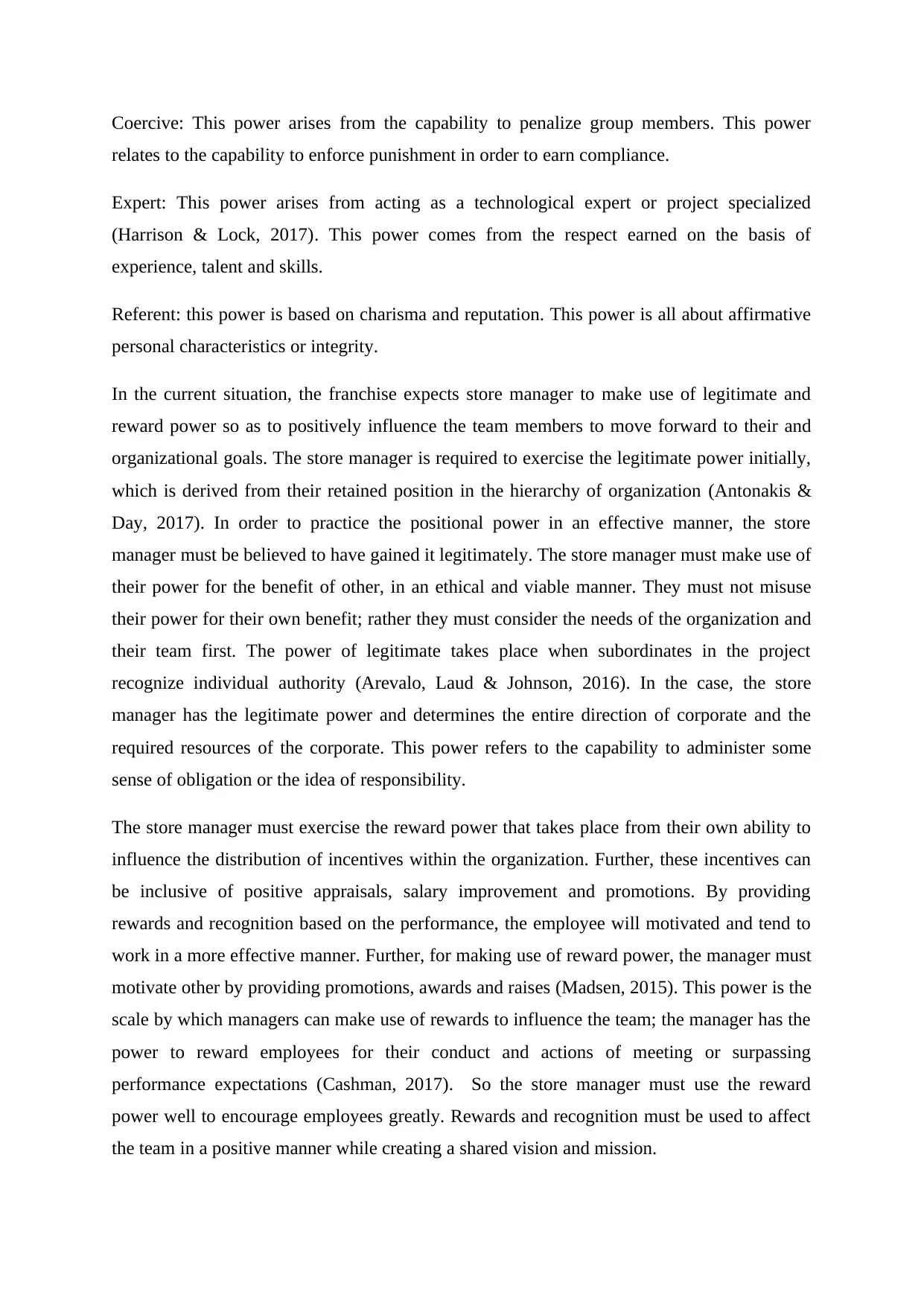
Coercive: This power arises from the capability to penalize group members. This power
relates to the capability to enforce punishment in order to earn compliance.
Expert: This power arises from acting as a technological expert or project specialized
(Harrison & Lock, 2017). This power comes from the respect earned on the basis of
experience, talent and skills.
Referent: this power is based on charisma and reputation. This power is all about affirmative
personal characteristics or integrity.
In the current situation, the franchise expects store manager to make use of legitimate and
reward power so as to positively influence the team members to move forward to their and
organizational goals. The store manager is required to exercise the legitimate power initially,
which is derived from their retained position in the hierarchy of organization (Antonakis &
Day, 2017). In order to practice the positional power in an effective manner, the store
manager must be believed to have gained it legitimately. The store manager must make use of
their power for the benefit of other, in an ethical and viable manner. They must not misuse
their power for their own benefit; rather they must consider the needs of the organization and
their team first. The power of legitimate takes place when subordinates in the project
recognize individual authority (Arevalo, Laud & Johnson, 2016). In the case, the store
manager has the legitimate power and determines the entire direction of corporate and the
required resources of the corporate. This power refers to the capability to administer some
sense of obligation or the idea of responsibility.
The store manager must exercise the reward power that takes place from their own ability to
influence the distribution of incentives within the organization. Further, these incentives can
be inclusive of positive appraisals, salary improvement and promotions. By providing
rewards and recognition based on the performance, the employee will motivated and tend to
work in a more effective manner. Further, for making use of reward power, the manager must
motivate other by providing promotions, awards and raises (Madsen, 2015). This power is the
scale by which managers can make use of rewards to influence the team; the manager has the
power to reward employees for their conduct and actions of meeting or surpassing
performance expectations (Cashman, 2017). So the store manager must use the reward
power well to encourage employees greatly. Rewards and recognition must be used to affect
the team in a positive manner while creating a shared vision and mission.
relates to the capability to enforce punishment in order to earn compliance.
Expert: This power arises from acting as a technological expert or project specialized
(Harrison & Lock, 2017). This power comes from the respect earned on the basis of
experience, talent and skills.
Referent: this power is based on charisma and reputation. This power is all about affirmative
personal characteristics or integrity.
In the current situation, the franchise expects store manager to make use of legitimate and
reward power so as to positively influence the team members to move forward to their and
organizational goals. The store manager is required to exercise the legitimate power initially,
which is derived from their retained position in the hierarchy of organization (Antonakis &
Day, 2017). In order to practice the positional power in an effective manner, the store
manager must be believed to have gained it legitimately. The store manager must make use of
their power for the benefit of other, in an ethical and viable manner. They must not misuse
their power for their own benefit; rather they must consider the needs of the organization and
their team first. The power of legitimate takes place when subordinates in the project
recognize individual authority (Arevalo, Laud & Johnson, 2016). In the case, the store
manager has the legitimate power and determines the entire direction of corporate and the
required resources of the corporate. This power refers to the capability to administer some
sense of obligation or the idea of responsibility.
The store manager must exercise the reward power that takes place from their own ability to
influence the distribution of incentives within the organization. Further, these incentives can
be inclusive of positive appraisals, salary improvement and promotions. By providing
rewards and recognition based on the performance, the employee will motivated and tend to
work in a more effective manner. Further, for making use of reward power, the manager must
motivate other by providing promotions, awards and raises (Madsen, 2015). This power is the
scale by which managers can make use of rewards to influence the team; the manager has the
power to reward employees for their conduct and actions of meeting or surpassing
performance expectations (Cashman, 2017). So the store manager must use the reward
power well to encourage employees greatly. Rewards and recognition must be used to affect
the team in a positive manner while creating a shared vision and mission.
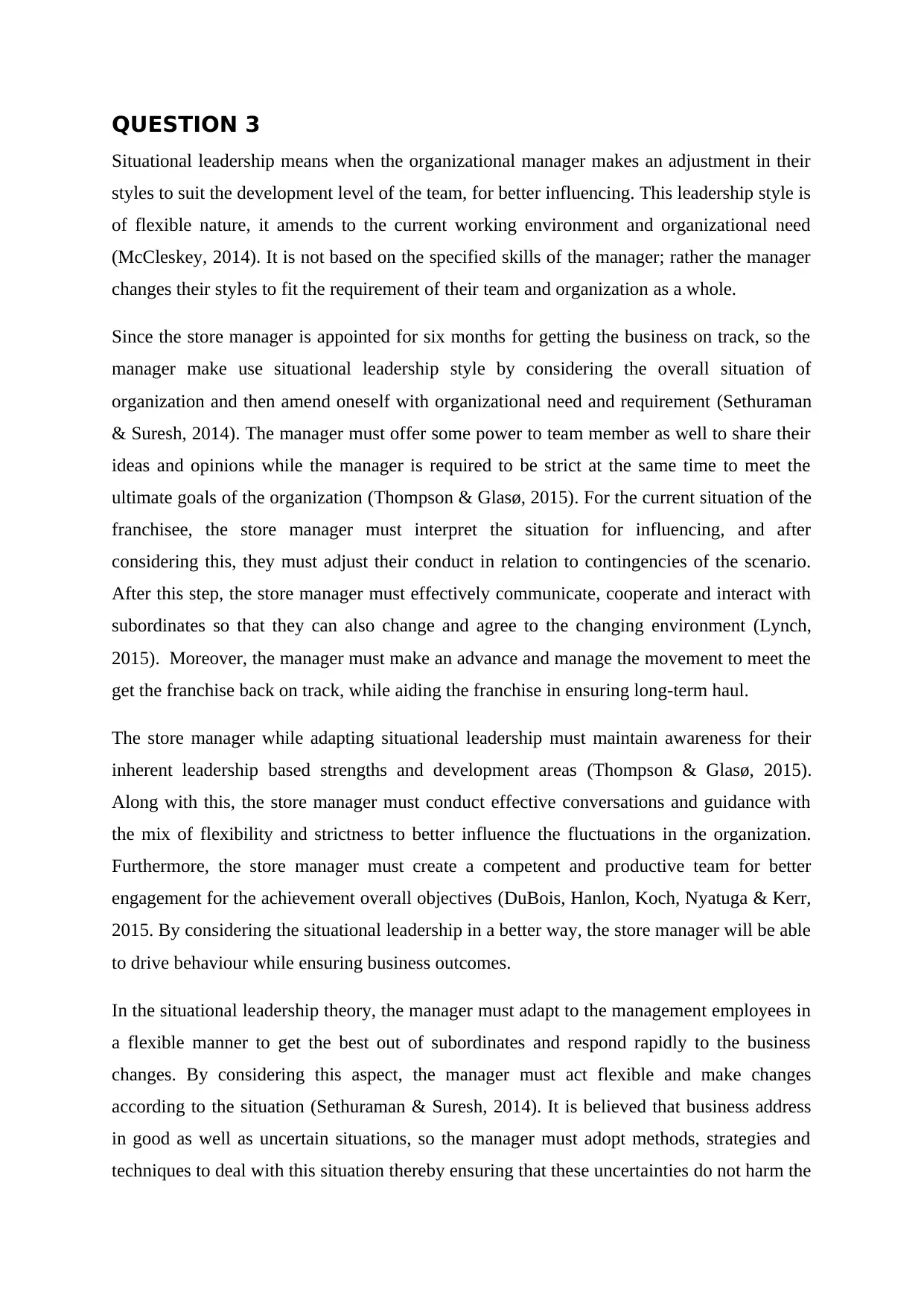
QUESTION 3
Situational leadership means when the organizational manager makes an adjustment in their
styles to suit the development level of the team, for better influencing. This leadership style is
of flexible nature, it amends to the current working environment and organizational need
(McCleskey, 2014). It is not based on the specified skills of the manager; rather the manager
changes their styles to fit the requirement of their team and organization as a whole.
Since the store manager is appointed for six months for getting the business on track, so the
manager make use situational leadership style by considering the overall situation of
organization and then amend oneself with organizational need and requirement (Sethuraman
& Suresh, 2014). The manager must offer some power to team member as well to share their
ideas and opinions while the manager is required to be strict at the same time to meet the
ultimate goals of the organization (Thompson & Glasø, 2015). For the current situation of the
franchisee, the store manager must interpret the situation for influencing, and after
considering this, they must adjust their conduct in relation to contingencies of the scenario.
After this step, the store manager must effectively communicate, cooperate and interact with
subordinates so that they can also change and agree to the changing environment (Lynch,
2015). Moreover, the manager must make an advance and manage the movement to meet the
get the franchise back on track, while aiding the franchise in ensuring long-term haul.
The store manager while adapting situational leadership must maintain awareness for their
inherent leadership based strengths and development areas (Thompson & Glasø, 2015).
Along with this, the store manager must conduct effective conversations and guidance with
the mix of flexibility and strictness to better influence the fluctuations in the organization.
Furthermore, the store manager must create a competent and productive team for better
engagement for the achievement overall objectives (DuBois, Hanlon, Koch, Nyatuga & Kerr,
2015. By considering the situational leadership in a better way, the store manager will be able
to drive behaviour while ensuring business outcomes.
In the situational leadership theory, the manager must adapt to the management employees in
a flexible manner to get the best out of subordinates and respond rapidly to the business
changes. By considering this aspect, the manager must act flexible and make changes
according to the situation (Sethuraman & Suresh, 2014). It is believed that business address
in good as well as uncertain situations, so the manager must adopt methods, strategies and
techniques to deal with this situation thereby ensuring that these uncertainties do not harm the
Situational leadership means when the organizational manager makes an adjustment in their
styles to suit the development level of the team, for better influencing. This leadership style is
of flexible nature, it amends to the current working environment and organizational need
(McCleskey, 2014). It is not based on the specified skills of the manager; rather the manager
changes their styles to fit the requirement of their team and organization as a whole.
Since the store manager is appointed for six months for getting the business on track, so the
manager make use situational leadership style by considering the overall situation of
organization and then amend oneself with organizational need and requirement (Sethuraman
& Suresh, 2014). The manager must offer some power to team member as well to share their
ideas and opinions while the manager is required to be strict at the same time to meet the
ultimate goals of the organization (Thompson & Glasø, 2015). For the current situation of the
franchisee, the store manager must interpret the situation for influencing, and after
considering this, they must adjust their conduct in relation to contingencies of the scenario.
After this step, the store manager must effectively communicate, cooperate and interact with
subordinates so that they can also change and agree to the changing environment (Lynch,
2015). Moreover, the manager must make an advance and manage the movement to meet the
get the franchise back on track, while aiding the franchise in ensuring long-term haul.
The store manager while adapting situational leadership must maintain awareness for their
inherent leadership based strengths and development areas (Thompson & Glasø, 2015).
Along with this, the store manager must conduct effective conversations and guidance with
the mix of flexibility and strictness to better influence the fluctuations in the organization.
Furthermore, the store manager must create a competent and productive team for better
engagement for the achievement overall objectives (DuBois, Hanlon, Koch, Nyatuga & Kerr,
2015. By considering the situational leadership in a better way, the store manager will be able
to drive behaviour while ensuring business outcomes.
In the situational leadership theory, the manager must adapt to the management employees in
a flexible manner to get the best out of subordinates and respond rapidly to the business
changes. By considering this aspect, the manager must act flexible and make changes
according to the situation (Sethuraman & Suresh, 2014). It is believed that business address
in good as well as uncertain situations, so the manager must adopt methods, strategies and
techniques to deal with this situation thereby ensuring that these uncertainties do not harm the
⊘ This is a preview!⊘
Do you want full access?
Subscribe today to unlock all pages.

Trusted by 1+ million students worldwide
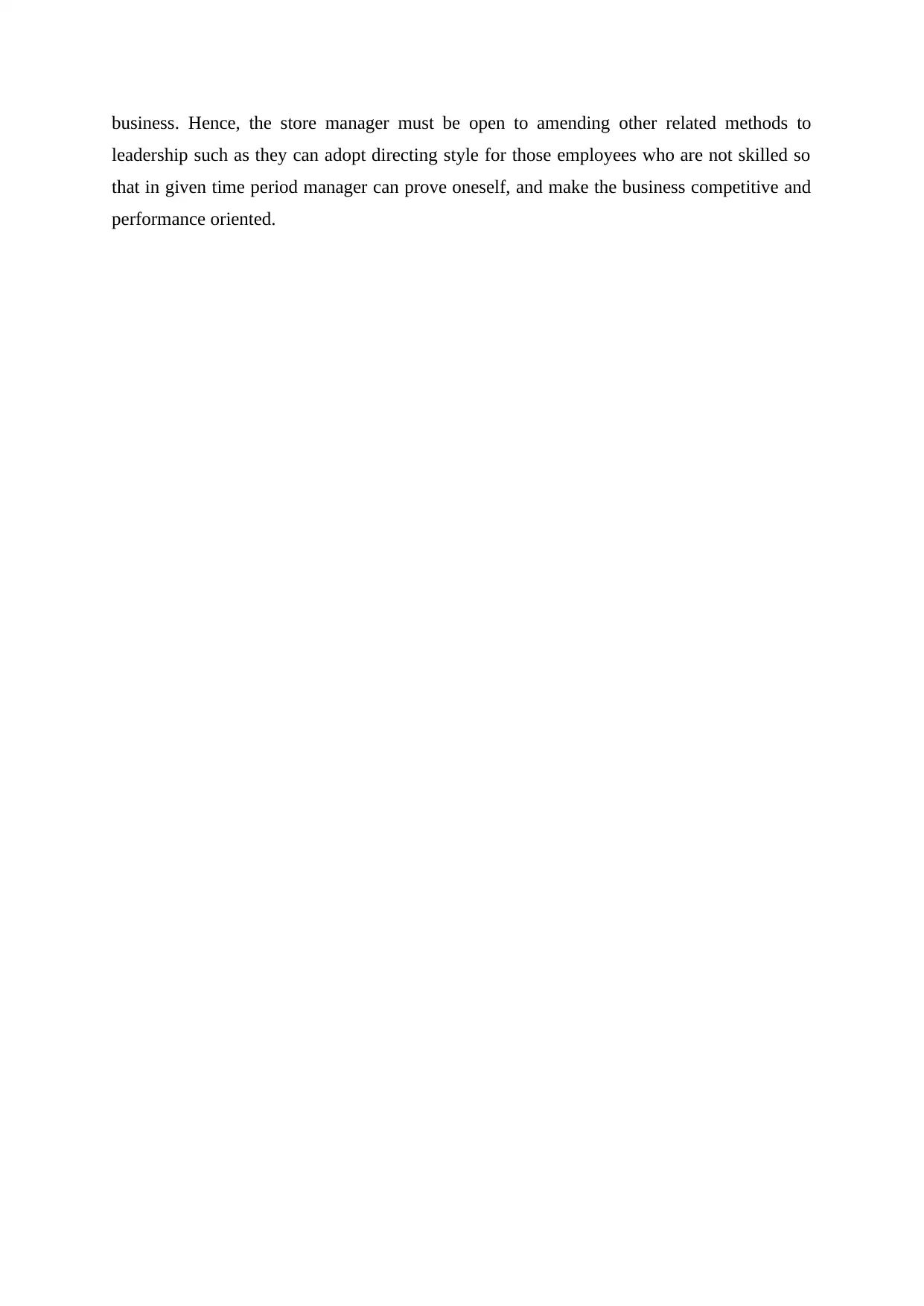
business. Hence, the store manager must be open to amending other related methods to
leadership such as they can adopt directing style for those employees who are not skilled so
that in given time period manager can prove oneself, and make the business competitive and
performance oriented.
leadership such as they can adopt directing style for those employees who are not skilled so
that in given time period manager can prove oneself, and make the business competitive and
performance oriented.
Paraphrase This Document
Need a fresh take? Get an instant paraphrase of this document with our AI Paraphraser
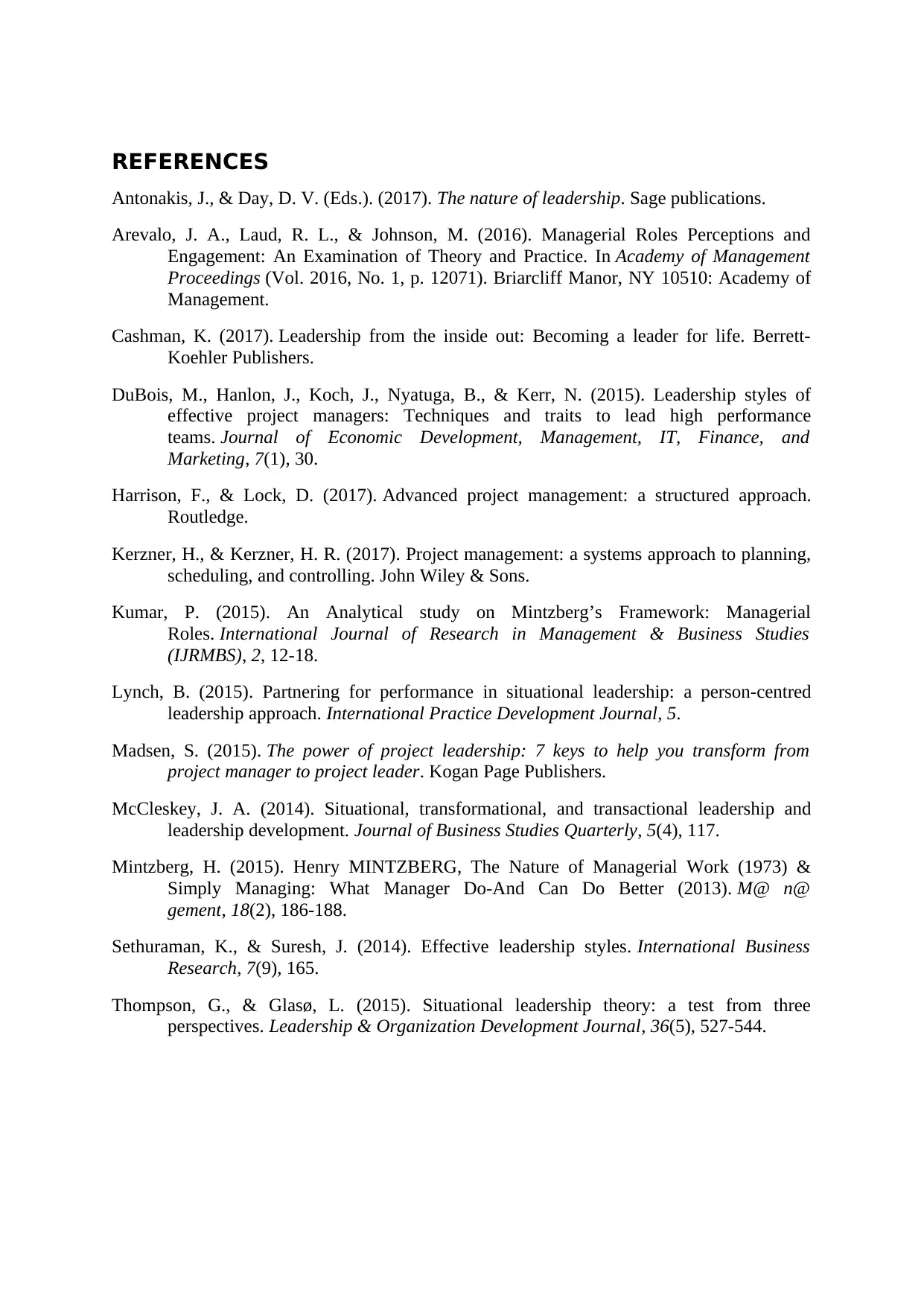
REFERENCES
Antonakis, J., & Day, D. V. (Eds.). (2017). The nature of leadership. Sage publications.
Arevalo, J. A., Laud, R. L., & Johnson, M. (2016). Managerial Roles Perceptions and
Engagement: An Examination of Theory and Practice. In Academy of Management
Proceedings (Vol. 2016, No. 1, p. 12071). Briarcliff Manor, NY 10510: Academy of
Management.
Cashman, K. (2017). Leadership from the inside out: Becoming a leader for life. Berrett-
Koehler Publishers.
DuBois, M., Hanlon, J., Koch, J., Nyatuga, B., & Kerr, N. (2015). Leadership styles of
effective project managers: Techniques and traits to lead high performance
teams. Journal of Economic Development, Management, IT, Finance, and
Marketing, 7(1), 30.
Harrison, F., & Lock, D. (2017). Advanced project management: a structured approach.
Routledge.
Kerzner, H., & Kerzner, H. R. (2017). Project management: a systems approach to planning,
scheduling, and controlling. John Wiley & Sons.
Kumar, P. (2015). An Analytical study on Mintzberg’s Framework: Managerial
Roles. International Journal of Research in Management & Business Studies
(IJRMBS), 2, 12-18.
Lynch, B. (2015). Partnering for performance in situational leadership: a person-centred
leadership approach. International Practice Development Journal, 5.
Madsen, S. (2015). The power of project leadership: 7 keys to help you transform from
project manager to project leader. Kogan Page Publishers.
McCleskey, J. A. (2014). Situational, transformational, and transactional leadership and
leadership development. Journal of Business Studies Quarterly, 5(4), 117.
Mintzberg, H. (2015). Henry MINTZBERG, The Nature of Managerial Work (1973) &
Simply Managing: What Manager Do-And Can Do Better (2013). M@ n@
gement, 18(2), 186-188.
Sethuraman, K., & Suresh, J. (2014). Effective leadership styles. International Business
Research, 7(9), 165.
Thompson, G., & Glasø, L. (2015). Situational leadership theory: a test from three
perspectives. Leadership & Organization Development Journal, 36(5), 527-544.
Antonakis, J., & Day, D. V. (Eds.). (2017). The nature of leadership. Sage publications.
Arevalo, J. A., Laud, R. L., & Johnson, M. (2016). Managerial Roles Perceptions and
Engagement: An Examination of Theory and Practice. In Academy of Management
Proceedings (Vol. 2016, No. 1, p. 12071). Briarcliff Manor, NY 10510: Academy of
Management.
Cashman, K. (2017). Leadership from the inside out: Becoming a leader for life. Berrett-
Koehler Publishers.
DuBois, M., Hanlon, J., Koch, J., Nyatuga, B., & Kerr, N. (2015). Leadership styles of
effective project managers: Techniques and traits to lead high performance
teams. Journal of Economic Development, Management, IT, Finance, and
Marketing, 7(1), 30.
Harrison, F., & Lock, D. (2017). Advanced project management: a structured approach.
Routledge.
Kerzner, H., & Kerzner, H. R. (2017). Project management: a systems approach to planning,
scheduling, and controlling. John Wiley & Sons.
Kumar, P. (2015). An Analytical study on Mintzberg’s Framework: Managerial
Roles. International Journal of Research in Management & Business Studies
(IJRMBS), 2, 12-18.
Lynch, B. (2015). Partnering for performance in situational leadership: a person-centred
leadership approach. International Practice Development Journal, 5.
Madsen, S. (2015). The power of project leadership: 7 keys to help you transform from
project manager to project leader. Kogan Page Publishers.
McCleskey, J. A. (2014). Situational, transformational, and transactional leadership and
leadership development. Journal of Business Studies Quarterly, 5(4), 117.
Mintzberg, H. (2015). Henry MINTZBERG, The Nature of Managerial Work (1973) &
Simply Managing: What Manager Do-And Can Do Better (2013). M@ n@
gement, 18(2), 186-188.
Sethuraman, K., & Suresh, J. (2014). Effective leadership styles. International Business
Research, 7(9), 165.
Thompson, G., & Glasø, L. (2015). Situational leadership theory: a test from three
perspectives. Leadership & Organization Development Journal, 36(5), 527-544.
1 out of 8
Related Documents
Your All-in-One AI-Powered Toolkit for Academic Success.
+13062052269
info@desklib.com
Available 24*7 on WhatsApp / Email
![[object Object]](/_next/static/media/star-bottom.7253800d.svg)
Unlock your academic potential
Copyright © 2020–2026 A2Z Services. All Rights Reserved. Developed and managed by ZUCOL.



